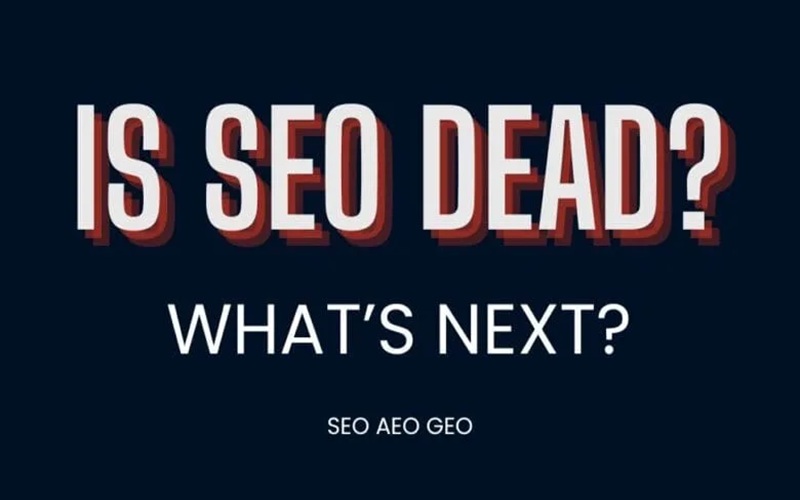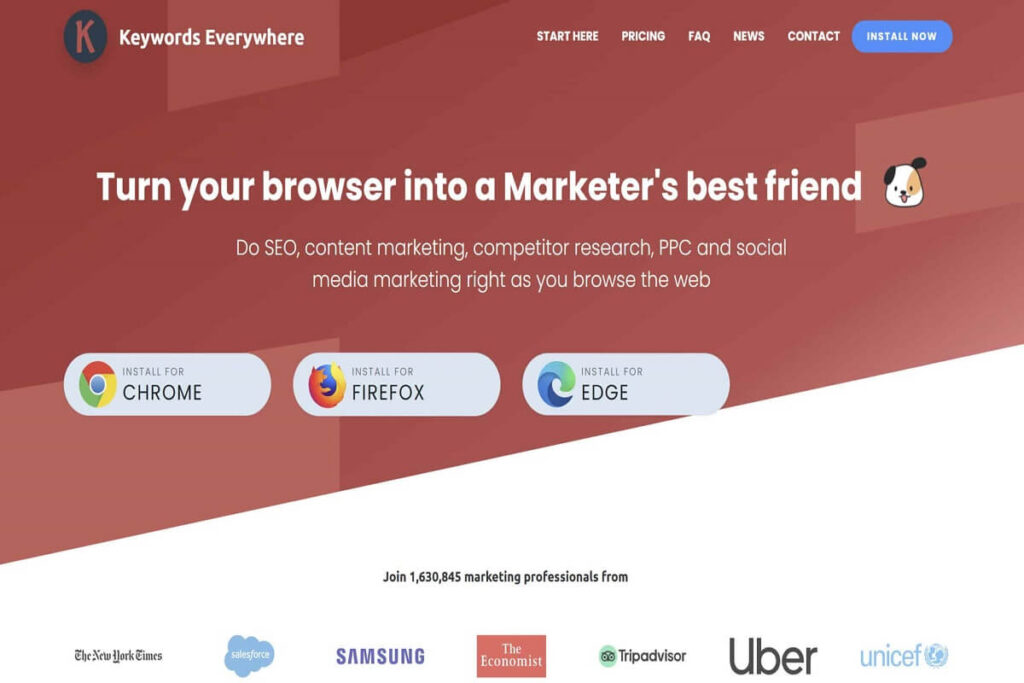Is SEO Dead in 2024? The Truth
No, SEO is not dead—but it’s evolving rapidly. Despite the rise of AI search engines, voice search, and paid ads, organic search remains a significant traffic driver, accounting for over 50% of web visits. SEO continues to evolve, with new factors such as user experience (UX), content quality, and search intent gaining prominence. Businesses that stay up to date with SEO best practices will thrive, as the core focus is still on delivering high-quality, relevant content that addresses users’ needs.
With the rise of AI chatbots (like Gemini, ChatGPT) and Google’s Generative AI Overviews (SGE), many wonder if traditional SEO still matters. Here’s why SEO is far from dead—but changing:
Why SEO Isn’t Dead
1. Google Still Drives ~90% of Search Traffic
-
Despite AI tools, most people still use Google for answers. As Rand Fishkin, co-founder of Moz, has consistently emphasized, Google’s dominance in search remains overwhelming, making SEO on Google crucial. AI Overviews (SGE) pull data from ranked web pages, meaning SEO still influences AI answers.
-
AI Overviews (SGE) pull data from ranked web pages, meaning SEO still influences AI answers.
2. AI Search Relies on SEO-Optimized Content
-
Google’s AI extracts info from high-ranking websites. If your content isn’t optimized, it won’t appear in AI answers. Danny Sullivan, Google’s Public Search Liaison, has often stated that the principles of creating helpful, high-quality content remain central to ranking, even as search evolves with AI. SEO now includes optimizing for Generative AI snippets (structured data, clear answers).
-
SEO now includes optimizing for Generative AI snippets (structured data, clear answers).
3. Zero-Click Searches Aren’t Killing SEO—They’re Changing It
-
Yes, featured snippets and AI answers reduce clicks, but brands that dominate these spots get more visibility. As Barry Schwartz, founder of Search Engine Roundtable, frequently discusses, while zero-click searches present a challenge, they also offer opportunities for brand exposure and establishing authority. SEO now focuses on being the #1 source for Google to quote.
-
SEO now focuses on being the #1 source for Google to quote.
What’s Changing in SEO?
1. Less Focus on “Traffic for Traffic’s Sake”
-
Low-quality informational pages (e.g., “What is X?”) are losing value to AI. According to Neil Patel, a prominent digital marketing expert, the focus is shifting from simply generating traffic to attracting qualified leads and building a loyal audience through valuable content. Winning strategy: Deep, expert-driven content that AI can’t easily replicate.
-
Winning strategy: Deep, expert-driven content that AI can’t easily replicate.
2. Brand Authority Matters More Than Ever
-
Google favors trusted sources (EEAT: Experience, Expertise, Authority, Trust). As Lily Ray, a renowned SEO consultant specializing in E-A-T, highlights, demonstrating expertise and authoritativeness through credentials, author bios, and citations is becoming increasingly critical for ranking. Example: A medical blog written by a doctor will outrank AI-generated health content.
-
Example: A medical blog written by a doctor will outrank AI-generated health content.
3. Technical SEO & UX Are Critical
-
If your site is slow, hard to crawl, or mobile-unfriendly, even great content won’t rank. John Mueller, Google Search Advocate, consistently emphasizes the foundational importance of technical SEO and a positive user experience for ensuring websites can be crawled, indexed, and enjoyed by users. Core Web Vitals, structured data, robots.txt, and site structure make or break rankings.
-
Core Web Vitals, structured data, robots.txt, and site structure make or break rankings.
SEO in the AI Era: How to Adapt
✅ Focus on EEAT – Prove your expertise (author bios, credentials, citations).
✅ Optimize for AI & Featured Snippets – Clear, concise answers with schema markup.
✅ Build Real Authority – Earn backlinks from trusted sites, not spammy directories.
✅ Create Content AI Can’t Replicate – Case studies, original research, expert interviews.
Introduction: SEO in 2025 – Alive and Evolving
“Did you know that organic search still drives over 50% of website traffic in 2025, despite the growing dominance of AI and paid advertising? As the digital landscape evolves, businesses may wonder if SEO is still worth the investment. The answer is a resounding yes.”
SEO is far from dead; in fact, it’s evolving to better meet the needs of users and search engines alike. While the tools and tactics may have shifted, the core principles of SEO—optimizing for relevance, quality, and user experience—remain vital for achieving success in the search engine rankings.
As we enter 2025, SEO isn’t just about ranking for keywords anymore. It’s about creating high-quality content, optimizing user experience (UX), and aligning with search intent. In this article, we’ll explore the myths and facts surrounding SEO in 2025, as well as the emerging trends shaping the future of search engine optimization.
You’ll discover why SEO is as relevant as ever, with strategies that focus on things like personalized search experiences, highly comprehensive content, and AI content optimization.
The Myths About SEO
Myth #1: SEO Is Dead and No Longer Effective
There’s a misconception that SEO is dead because of AI and paid ads. The reality? Organic search still accounts for over 50% of website traffic. While paid ads are growing in importance, SEO remains a cornerstone of any successful digital marketing strategy. For example, Dropbox continues to thrive thanks to its organic traffic strategy, driven by solid SEO practices. As numerous industry reports from sources like BrightEdge and SEMrush consistently show, organic search remains a leading source of website traffic and revenue . The idea that SEO no longer matters is simply outdated.
Myth #2: SEO Only Relies on Keywords
In the early days of SEO, the mantra was simple: optimize for specific keywords. But in 2025, keyword stuffing isn’t effective and can even harm your rankings. Google’s algorithms now focus more on search intent. For example, a search for “best running shoes” might return a detailed comparison of models rather than a page simply stuffed with keywords. If your content doesn’t match the user’s intent, it won’t rank well. As Dr. Pete Meyers from Moz often explains, understanding and targeting search intent is the new frontier of keyword research. Google has become smarter at interpreting context and relevance rather than just looking for keyword matches.
Google has become smarter at interpreting context and relevance rather than just looking for keyword matches.
Myth #3: Link Building Is the Only Way to Rank
Many still believe that accumulating backlinks is the key to SEO success. But link building has evolved—quality matters more than quantity. Google has become much better at spotting low-quality or spammy backlinks. It now prioritizes authoritative, relevant links that provide true value to users. Case in point: High-quality content can generate backlinks organically. For instance, HubSpot’s in-depth guides often earn valuable links naturally because of their authority and relevance. Julie Joyce, a respected link building expert, emphasizes that earning high-quality, contextual backlinks from relevant websites is far more impactful than acquiring a large number of low-quality links.
Myth #4: SEO Delivers Instant Results
Unlike paid ads, SEO isn’t a quick fix. Many businesses still think they can optimize their site and see results immediately, but it takes time. In highly competitive industries, SEO results may take 3-6 months to show. SEO is a long-term investment, and businesses must continuously optimize, adapt to changes, and monitor results. As many SEO professionals like Aleyda Solis consistently advise, SEO requires patience, persistence, and a strategic long-term approach. This is why patience and consistent effort are key.
The Facts About SEO in 2025
Fact #1: SEO Is Constantly Evolving
Google is always updating its algorithms, and staying on top of those changes is essential for success. In 2025, it’s no longer just about optimizing for keywords and backlinks—it’s about creating a holistic user experience. Core Web Vitals (page speed, interactivity, visual stability) are now essential ranking factors. Google evaluates whether a page is helpful and user-friendly.
Take eBay, for example. Their focus on page speed and mobile-friendly design led them to significantly improve their organic search visibility, proving that SEO’s focus is now broader than ever before.
Fact #2: Content Quality Is Still King
Content remains at the heart of SEO. Google’s BERT and RankBrain updates have improved its ability to understand the context of user queries and return content that best addresses their needs. Content quality, however, isn’t just about length or keywords. It’s about producing authoritative, in-depth, and relevant content. Google rewards content that satisfies search intent, such as a detailed comparison of different laptops for a specific need.
For example, businesses that create comprehensive content on topics in their niche—like Backlinko’s ultimate guide to SEO—are far more likely to rank than those relying on brief, superficial content.
Fact #3: User Experience (UX) Directly Impacts Rankings
User experience is now one of the primary ranking factors for SEO. Google’s Core Web Vitals update emphasized this, making metrics like page speed optimization, mobile-friendliness, and site interactivity critical for ranking. Websites that are fast, mobile-optimized, and easy to navigate will see better rankings.
For example, a website like Amazon invests heavily in UX to ensure users find what they need quickly, resulting in better engagement, higher dwell time, and fewer bounce rates—all of which improve rankings.
Actionable Tip: Use tools like PageSpeed Insights or GTmetrix to assess your website’s loading speed and Google’s Mobile-Friendly Test to ensure your site performs well on mobile.
Fact #4: AI-Generated Content Can Rank—If It’s High Quality
AI content tools are here to stay, and they’re only getting smarter. AI-generated content can rank, but it needs to meet the same standards as human-written content. Google cares about helpfulness and quality, not who wrote the content. AI tools like GPT-3 are excellent for creating content drafts or brainstorming ideas, but it’s important that the content is fact-checked, aligned with the brand voice, and optimized for EEAT (Expertise, Authoritativeness, Trustworthiness).
Take Jasper.ai as an example: businesses that use it to generate content must ensure human oversight to meet Google’s standards. Content should always be fact-checked, aligned with the brand’s expertise, and helpful to the user.
Fact #5: E-A-T is Crucial for High-Quality Content
Google’s focus on E-A-T (Expertise, Authoritativeness, and Trustworthiness) is essential for SEO in 2025. Google favors websites that can demonstrate authority on their topics. Websites with author bios, expert citations, and secure, well-maintained websites are more likely to rank higher. For example, Healthline, a health blog, ranks well because it includes doctor-approved content and citations from medical studies.
Actionable Tip: To improve E-A-T, make sure your content includes citations from credible sources, author bios that highlight qualifications, and a secure HTTPS website.
Conclusion
SEO in 2025 isn’t dead—it’s thriving and evolving in exciting ways. The most successful businesses will be those that adapt to the new SEO realities, such as the growing importance of user experience, the shift toward AI-generated content, and the continued need for high-quality, authoritative content.
The future of SEO belongs to those who create user-centric experiences, leverage AI wisely, and build content that answers real user needs. By staying on top of these trends, businesses can thrive in the ever-changing landscape of digital marketing.
SEO is alive, and it’s here to stay. Embrace the changes, adapt your strategies, and prioritize user needs—and your business will continue to see success in the search results.
Saad Raza is an SEO specialist with 7+ years of experience in driving organic growth and improving search rankings. Skilled in data-driven strategies, keyword research, content optimization, and technical SEO, he helps businesses boost online visibility and achieve sustainable results. Passionate about staying ahead of industry trends, Saad delivers measurable success for his clients.





